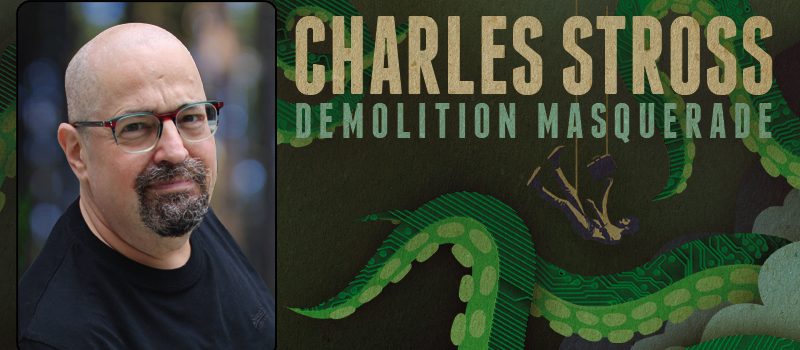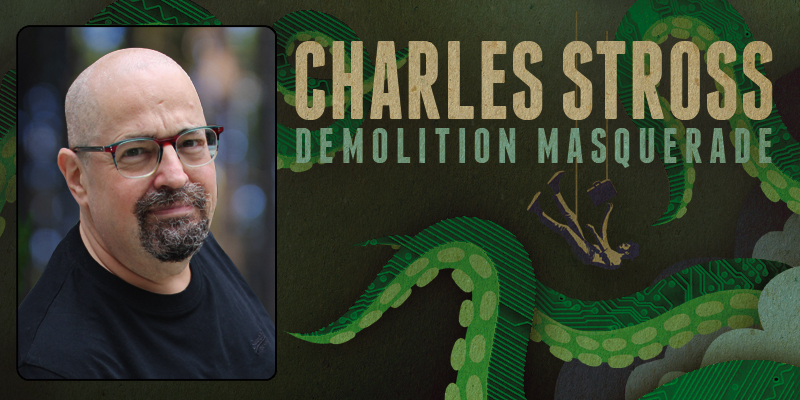Charles Stross: Demolition Masquerade
CHARLES DAVID GEORGE STROSS was born October 18, 1964 in Leeds, England. Stross began writing SF at age 12, and his earliest publications were articles for roleplaying game magazines in the ’70s and ’80s. He earned a bachelor’s in pharmacy in 1986, qualified as a pharmacist in 1987, then enrolled at Bradford University (1989-90) for a post-graduate conversion degree in computer science. He worked as a technical writer and programmer until 2000, when he began writing full time, mostly technology-related non-fiction at first, including the book The Web Architect’s Handbook (1996). He gradually shifted his focus to fiction.
Stross’s first professional story sale, “The Boys’’, appeared in 1986, and he has published steadily since then. Novelette “Lobsters’’ (2001) was nominated for the Hugo and Nebula Awards, and was runner-up for the Sturgeon Award; novelette “Halo’’ (2002) was a Hugo and Sturgeon nominee; “Router’’ (2002) was shortlisted for a BSFA award; novelette “Nightfall’’ (2003) was a Hugo and BSFA nominee; time-travel novella “Palimpsest’’ (2009) won a Hugo, and novella Missile Gap was published in 2007. Some of his short fiction has been collected in Toast (2002) and Wireless (2009).
Stross collaborated with Cory Doctorow on several short stories, notably “Jury Service’’ (2002), sequel “Appeals Court’’ (2004) (later published together as “The Rapture of the Nerds’’), and “Flowers from Alice’’ (2003). An expanded novel version of The Rapture of the Nerds appeared in 2012 and was a finalist for the John W. Campbell Memorial Award.
His first SF novel was the Hugo Award-nominated far-future space opera Singularity Sky (2003), which led to sequel Iron Sunrise (2004). His Accelerando series of SF stories, which appeared in Asimov’s beginning with “Lobsters’’ in 2001 and ending with “Elector’’ in 2004, were adapted into a novel, Accelerando (2005), a Hugo and John W. Campbell Memorial Award finalist.
Far-future SF novel Glasshouse (2006) was a Hugo finalist and winner of the Prometheus Award. Near-future SF novel Halting State (2007) was a Hugo finalist, and was followed by sequel Rule 34 (2011). Space opera and Heinlein homage Saturn’s Children (2008) was a Hugo and Prometheus Award nominee, with sequel Neptune’s Brood (2014) a Hugo and Campbell Memorial Award finalist. He released his early, previously unpublished SF novel Scratch Monkey in 2011.
Lovecraftian spy thriller The Atrocity Archive (serialized 2001-02) began the Laundry series, and appeared in hardcover along with Hugo Award-winning novella “The Concrete Jungle’’ in 2004. Sequels are The Jennifer Morgue (2006), The Fuller Memorandum (2010), The Apocalypse Codex (2012), The Rhesus Chart (2014), The Annihilation Score (2015), The Nightmare Stacks (2016), The Delirium Brief (2017), and The Labyrinth Index (2018). The New Management spin-off began with Dead Lies Dreaming (2020) and was followed by Quantum of Nightmares (2022), with Season of Skulls forthcoming. He’s also written stories in the setting, including Hugo Award nominee “Overtime’’ (2009), Hugo winner “Equoid’’ (2013), and Escape from Yokai Land (2022). The Laundry Files was nominated for a Hugo Award for Best Series in 2019.
He began his Merchant Princes series – multiverse SF masquerading as fantasy – with The Family Trade (2004), followed by The Hidden Family (2005), The Clan Corporate (2006), The Merchant’s War (2007), The Revolution Business (2009), and The Trade of Queens (2010).They were re-edited as a “trilogy’’ of long novels and released as The Bloodline Feud, The Traders’ War, and The Revolution Trade in 2013 and 2014. The Empire Games trilogy set later in the same world launched with Empire Games (2017) and continued with Dark State (2018) and Invisible Sun (2021). The series was a Hugo Award finalist for Best Series this year.
Stross lives in Edinburgh, Scotland with wife Feòrag NicBhride (married 2003).
Excerpt from the interview:
“Writing a series involves collaborating with your younger self. One of the reasons I want to close out the Laundry story arc is because it involves Bob, who I invented in 1998 when I was 34 or 35 years old. By the time the next the Glasgow Worldcon rolls round I will be just shy of 60, and it’s hard for a 60-year-old guy to write like a 35-year-old. I think it would be dishonest of me to keep going on that basis: much better to draw a line under it and start something different.
“I mentioned a novella I need to finish when I go home. I began writing A Conventional Boy in May 2009: it’s possibly my most overdue active project! It’s an examination of Derek the DM, a side character who shows up in The Laundry universe in The Nightmare Stacks (book seven). It was originally meant to be finished before The Delirium Brief (book eight) came out… in 2014. It does help fill in a chunk of backstory of the Laundry, but the real reason for picking it up now is that, over a decade later, its central premise (a look at the 1980s Satanic D&D panic) has become acutely relevant again. I could, in principle, explore the Laundry backstory indefinitely, but it would feel dishonest, like I was milking it as a cash cow: and that’s not something I’d be comfortable doing.
“The Laundry Files has been optioned for TV rights a couple of times. The most recent option contract was signed right before COVID-19 and nothing has happened, so I assume it’s dead in the water – but you can never tell. I gather that what I write is rather difficult to convert to a screenplay, anyway. There’s too much introspection and interior character development. But we’ll see.
“There have been other spin-offs along the way. The Laundry Files spawned a table-top roleplaying game which came out in 2010. Unfortunately it had to be withdrawn from sale in 2018 because the developers had licensed the Call of Cthulhu rules, and Chaosium canceled all their sub-rights licensing deals, following a management change. Think of Disney withdrawing all their movies from Hulu – that sort of thing happens in other media too. I think I’m allowed to say there will be a second-edition roleplaying game eventually, but I can’t say any more at this point.
“I have other projects I’m thinking about – a whole dusty pile of them, in fact. My 2009 novella ‘Palimpsest’ could at some point get turned into a novel. ‘Palimpsest’ was originally structured to be the first third of a book: it explores deep time, from the beginning of the Great Oxygen Catastrophe when the Earth’s biolithosphere began to oxygenate a billion years ago, to the end of the Stelliferous Era, 2.5 trillion years in our future, when star formation ends. The middle was going to run from the Stelliferous Era through to the end of the black hole era, and the final third was going to run to the Boltzmann Brain Era in the very distant future: but getting my head around writing that was difficult to say the least. I’m still chewing on it from time to time.
“Again, there was going to be a third near-futureScottish police procedural after Halting State and Rule 34. Unfortunately, when I finally got my head around a plot I could make work, COVID-19 destroyed it. It was going to be about living with the aftermath of a global viral pandemic, which is a bit too on the nose right now: my fictional virus caused an epidemic of encephalitis resulting in a particular long-term symptom of brain damage called Cotard’s delusion. A Cotard’s patient believes they are dead. They usually present with severe depression, and frequently starve to death; the book hinges on the idea of using deep brain stimulation to treat the condition. As long as the brain implant works, you think you’re alive again. Of course, these implants would be leased, and eventually, the company renting them out goes bust and is taken over by a Martin Shkreli-like figure who jacks the price of the rental agreement for keeping your implant working, and then sends out repo men to turn them off using malware if you’re not meeting your payment schedule. It opens with someone walking into a police station to complain that they’ve been murdered, and being a police procedural it escalates from there.
“Unfortunately reality ran over that novel with a semi-truck: If I’d written it in 2018 it’d have come out in time, but by 2020 it was clearly too late. It would have been, ‘The present situation is awful and it sucks.’
“Talking about a pandemic is all very well, but recently I was discussing what’s currently popular with my agent and editors, and there’s currently huge demand in publishing for cozy fiction, that is: consolatory reading, stuff that makes us feel good about ourselves, or lets us ignore the horrors of the real world for a while. It became obvious in 2020 with lockdown that people want comfort reading this decade – lots of it. Cozy fiction like Travis Baldree’s Legends and Lattes is immensely popular: it’s about an orc in a D&D setting who gets fed up with adventuring and wanders off to open a coffee shop in a town that’s never heard of coffee. And this is a surprise came-out-of-nowhere hit in 2022. Then there’s Becky Chambers, whose work is entirely consolatory – there’s a lot of it about when you start looking. And I have to say, I’m scratching my head. This is, alas, one trend I’m probably incapable of jumping aboard.
“Bear in mind that fiction usually leverages a conflict dynamic to engage the reader’s attention. Broadly, there are three types of conflict: Man vs. Man, Man vs. Nature, and Man vs. Self. (I’m using the generic ‘Man’ here because ‘Person’ feels too cumbersome – I want a better pronoun!) Man vs. Self tends to be introspective, but is where a lot of cozy fiction comes in. Man vs. Nature is stereotypically about a distaster – a rare example of a positive-thinking version would be Kim Stanley Robinson’s Ministry for the Future. And Man vs. Man – interpersonal strife – is generally conflict-oriented. It’s also what I feel I do best, which isn’t terribly cozy! It’s difficult for me to feel optimistic right now because I live in the UK and the UK right now is a dumpster fire surrounded by oceans of sewage and ruled by maniacs. I shouldn’t bring up politics, but I am finding it very, very difficult to feel optimistic about the near future – and not just because I’ve found myself turning into a grumpy old man living as an extra in a medical disaster novel.
“I’ve almost given up reading sci-fi for the past couple of years. I need to start again. There’s stuff out there that I know I should be reading and engaging with, but it tends to be either too conflict-ridden or too twee – or self-consciously retro, and I don’t feel the need to keep revisiting the genre’s past.
“I’ve noticed that a lot of innovation seems to come from self-published and fanfic authors these days. I’m not generally a big fanfic reader but there are some weird and amazing phenomena out there. Take the SCP Foundation for example. They run a wiki of weird, user-contributed fiction focusing on a common theme. The SCP Foundation’s motto is ’secure, Contained, Protected’. The premise is that SCP is a shadowy government agency that takes inexplicable X-Files-esque phenomena and contains them securely. The SCP Foundation wiki is an absolutely remarkable example of collaborative fanfic: some of the stuff on it is very high concept indeed. In particular, I’ve been following one author – Qntm, no vowels – who has written one of the most terrifying short stories I’ve ever read. ‘Lena’ is structured as a Wikipedia monograph about the first brainscan image suitable for mind uploading and emulation in software, and what happens to it over the course of the 50 years or so after it is recorded. Total existential horror. Qntm has self-published a number of books and if I had to compare them to anyone, it would be to Greg Egan. You can read it at <qntm.org/lena>.
Cover and interview art and design by Francesca Myman
This report and more like it in the November 2022 issue of Locus.
 While you are here, please take a moment to support Locus with a one-time or recurring donation. We rely on reader donations to keep the magazine and site going, and would like to keep the site paywall free, but WE NEED YOUR FINANCIAL SUPPORT to continue quality coverage of the science fiction and fantasy field.
While you are here, please take a moment to support Locus with a one-time or recurring donation. We rely on reader donations to keep the magazine and site going, and would like to keep the site paywall free, but WE NEED YOUR FINANCIAL SUPPORT to continue quality coverage of the science fiction and fantasy field.
©Locus Magazine. Copyrighted material may not be republished without permission of LSFF.










“The Laundry Files spawned a table-top roleplaying game which came out in 2010. Unfortunately it had to be withdrawn from sale in 2018 because the developers had licensed the Call of Cthulhu rules, and Chaosium canceled all their sub-rights licensing deals, following a management change.”
What Charles says here is not quite correct: the Cubicle7–Chaosium licensing deal for Call of Cthulhu wasn’t cancelled; it was amicably wound up by mutual agreement when the agreement came due in 2018. Instead of renewing the license with us, C7 decided they would be bringing out their own stand-alone version of The Laundry RPG, using their own rules. See:
https://forum.rpg.net/index.php?threads/cubicle-7-and-call-of-cthulhu.820320
(nb the management change at Chaosium that Charles mentions actually took place three years earlier. We didn’t cancel all our sub rights licensing deals, either then or later.)